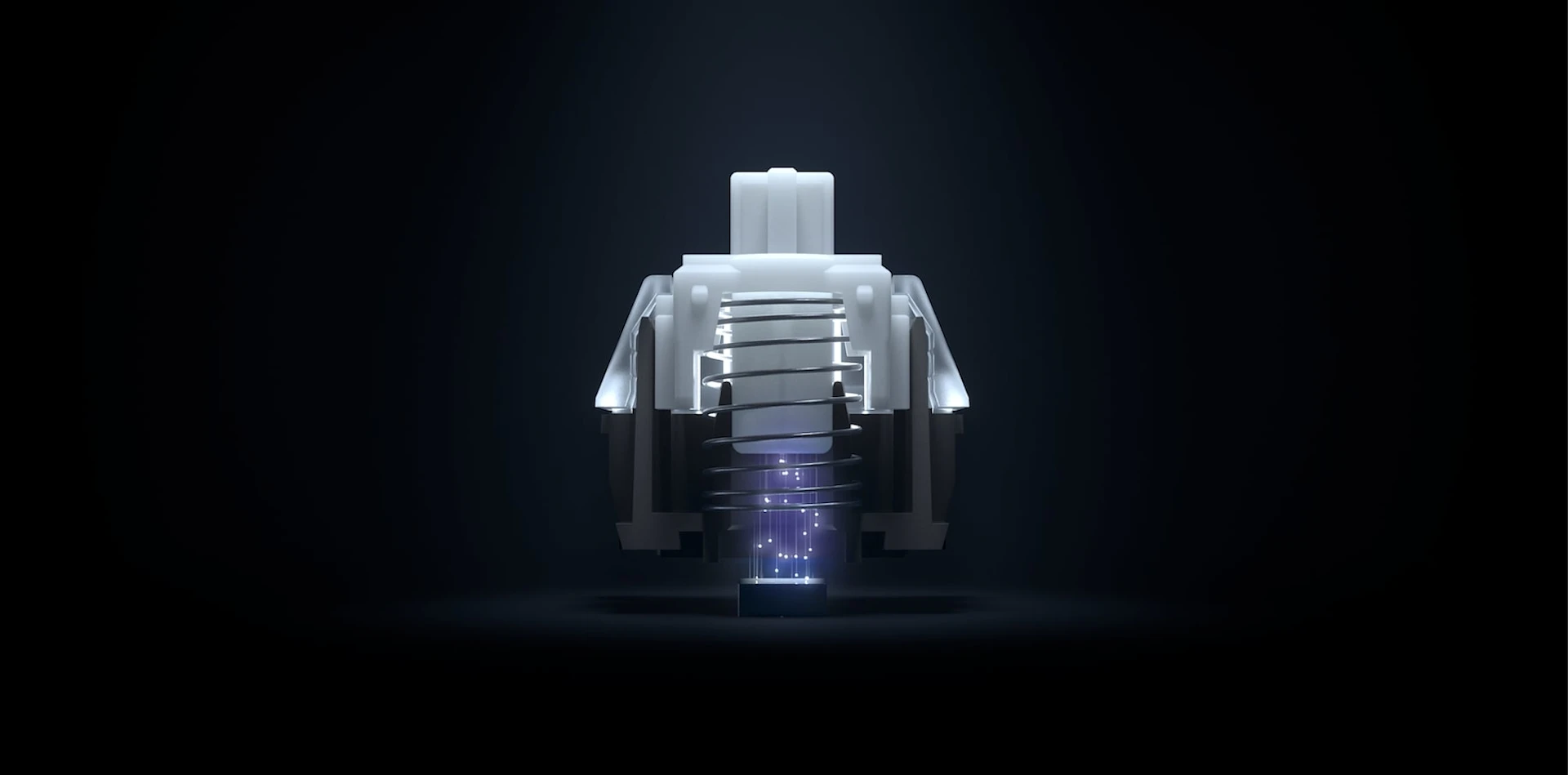
What are Adjustable Mechanical Switches?
An explanation of the Apex Pro's groundbreaking OmniPoint adjustable mechanical switches.

What are adjustable mechanical switches, and why would you want them? Let's explore the biggest game changer in mechanical switches since their invention 35 years ago.
The switch wars
In the world of gaming keyboards, there has been a race to have the fastest switch in the world.
The reasoning was simple: if you can hit a key even a split second before the enemy, it could mean the difference between a win and a loss.

Becoming the "fastest" switch has been achieved in two basic ways: by shortening the distance that a key needs to travel until it electronically registers a keypress (AKA actuation), and by speeding up the response time once a keypress is made.
Step by step, actuation distance has been shrinking over the years, allowing switches to actuate faster and faster one millimeter at a time.
Unfortunately, there's been a salty price for this kind of speed.
The accidental side effect
Not having to travel very far makes keys insanely sensitive. This is a great benefit for pro players who need an advantage on the tournament stage.
But not everyone finds it easy to type on an ultra-fast, ultra-sensititive keyboard at all times.
On most mechanical gaming keyboards, even lightly brushing a nearby key can result in an unintended keypress, which is annoying when you’re trying to type, and even worse in the middle of an important match.
So no, all those typos aren't caused by just your sausage fingers: it’s your keyboard.
It takes time and practice to hone in on pro-level accuracy when your keyboard is so hyper-sensitive that even bumping a key will cause it to register. It's an aquired skill, and it's definitely not needed at all times.
While many seasoned pros prefer super sensitive high actuation keyboards for speed, typing enthusiasts and many other gamers prefer lower actuation keyboards for increased accuracy, ensuring that each keypress is more deliberate.
Ending the switch wars
So we didn't want to make yet another fastest switch in the world.
Instead, we asked ourselves if we could eliminate the need to settle for a keyboard that only meets one type of person with one type of actuation.

Sometimes you need top speed, sometimes you need perfect accuracy, and most of the time, you probably need a mixture of both.
What if a keyboard could let you adjust your sensititivity based on what you were doing, just like you can adjust the sensititivity on a mouse?
Changing the game
Since their invention, mechanical switches have worked in the same way: two metal contact points touching, creating a signal.
An exact fixed point of actuation: Up or down. Yes or no. On or off.
Switches could only get faster and faster by shrinking the actuation distance, but the mechanism (and it's limitations) stayed the same.
So how would we go about creating a switch that would allow someone to change the exact point at which a keypress registers?
The leap forward
5 years ago, we went back to the drawing board. What if we re-invented the mechanical switch altogether?

We came up with a new kind of analog mechanical switch that would solve this problem: OmniPoint (meaning "all points").
Using magnetic fields (also know as Hall effect), OmniPoint switches measure the exact distance that a key is pressed at all times. This allows each key to be adjusted to the exact point at which you want it to register.

With 5x faster actuation and 8x faster response time than a traditional mechnical switch, OmniPoint switches put an end to the speed wars.
But more importantly, each key can be adjusted to anyone's needs, even if they change during the day. Whether you're honing your competitive skills and precision, spamming Twitch chat, or simply typing up an email, your keyboard can now be whatever you need it to be.

From deliberate typo-free keypresses, to the new fastest actuation in the world, and everything in between, OmniPoint is the next big leap in mechanical switch technology.
So how does it feel?
OmniPoint switches have the smooth and linear feel of red mechanical switches. Adjusting the actuation point affects when the keyboard registers the keypress, but not how the key physically feels under your fingers. Each key travels the same distance when bottoming out at any actuation point.
Make it your own

Since OmniPoint switches aren't limited to a fixed actuation, we also thought it was important to make the sensitivity of each key uniquely customizable. You might want different actuation levels across different keys for various use cases:
Design an FPS profile for when you open up CS:GO:
- You may want WASD to be super sensitive, so you don’t waste a split second on movement commands.
- Set “G” to a deeper actuation so you never huck a grenade unless you really, really, meant to huck it.
- Set the rest of the keys to a nice low actuation point for chat accuracy.
When you launch a MOBA?
- Try QWER and most of your item hotkeys at a high, but not too high actuation: you want the fastest possible reaction time, without sausage-fingering your ultimate by accident. This could take some trial and error to find about how sensitive you can go without risk.
- Set the rest of the keys to a nice deep actuation point for that sexy all chat accuracy.
MMO’s?
- You want those rotations nice and fast and crisp, but there's no room for error, so something in the middle might make the most sense.
- Does your cat likes to chill out around your keyboard? A nice deep actuation will help prevent those accidental tail inputs.
When you're at work:
- Make a lot of typos? Try a deep actuation point to make sure you're not accidentally pressing any incorrect keys.
- Maybe you're a crazy fast typer hyped up on coffee, and you find yourself having trouble with HOlding THe SHift KEy a split second too long. Change the sensititivy for the shift key, problem solved.
These are just some of the settings that we suggest. Of course, the best actuation setup is the one designed by you!
An added benefit
On traditional mechanical switches, the metal contact points tend to degrade over time, lowering their lifespan and durability as the metal contact points degrade.
With no points of physical contact, OmniPoint switches are guarenteed for 100 million keypresses or more (2x the industry standard), because their response time never degrades with use. The actual durability is technically far greater than 100 million, it just takes a long time for our testing robots to press a single key 200 million times.
So, not only can each key on the Apex Pro can be adjusted to meet your preferred sensitivity level; it will also last you longer than any other mechanical keyboard on the market.

If you're still feeling a little lost, here's a great overview from LinusTechTips:
The innovative OmniPoint switches are only available on the Apex Pro and Apex Pro TKL.

When she's not wreaking havoc as Techies in Dota 2, Megan dabbles in almost any PC game, most recently Overwatch, Hades, and Warzone.